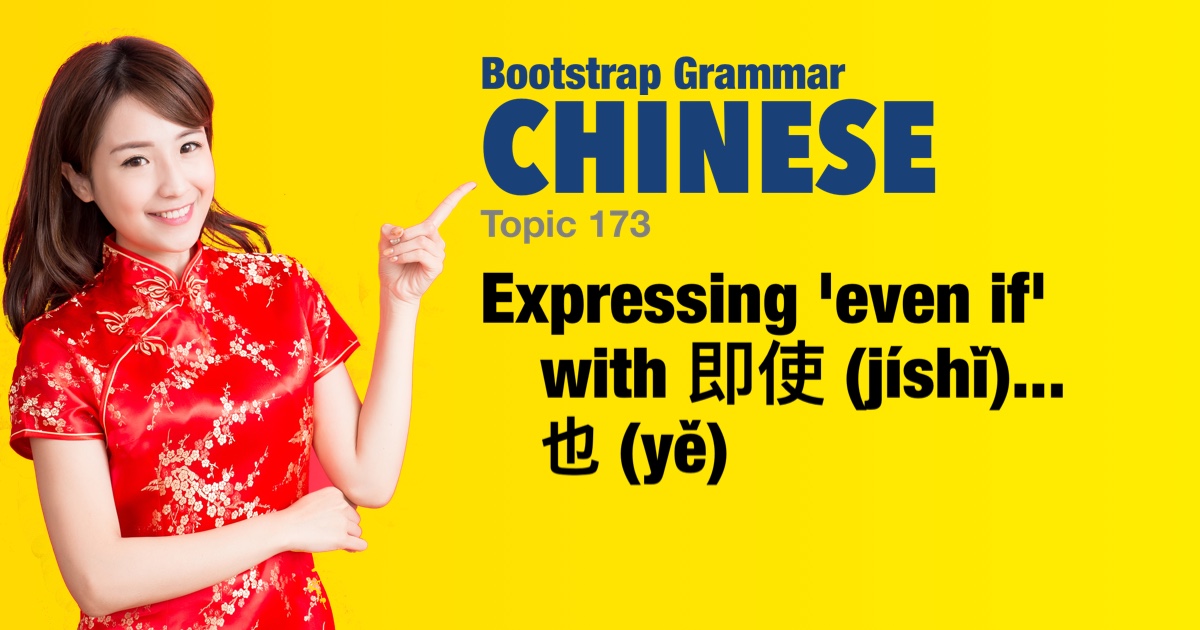Chinese grammar - Expressing 'even if' with 即使 (jíshǐ)...也 (yě) |
|||
|
|||
The couplet 即使 (jíshǐ) and 也 (yě) are used together in Chinese to form a conditional clause that means 'even if' or 'even though'. This structure is used to express that a certain result will occur regardless of a hypothetical condition. |
| Examples: | |
|
即使这个星期下雨,我们也会去郊游。
jíshǐ zhè ge xīngqī xiàyǔ,#wǒmen yě huì qù jiāoyóu. Even if it rains this week, we will still go on an outing (picnic).
|
|
|
即使上个月很冷,我们也去了海边。
jíshǐ shàng ge yuè hěn lěng,#wǒmen yě qù le hǎibiān. Even though it was very cold last month, we still went to the beach. |
|
|
即使这个月有很多会议,我也会参加。
jíshǐ zhè ge yuè yǒu hěnduō huìyì,#wǒ yě huì cānjiā. Even if there are many meetings this month, I will still attend. |
|
|
即使下个月他不在家,我也会去看他的父母。
jíshǐ xià ge yuè tā bù zài jiā,#wǒ yě huì qù kàn tā de fùmǔ. Even if he is not home next month, I will still visit his parents. |
|
|
即使上个周末我很累,我们也去了公园。
jíshǐ shàng ge zhōumò wǒ hěn lèi,#wǒmen yě qù le gōngyuán. Even though I was very tired last weekend, we still went to the park. |
|
|
即使上个假期没有钱,我们也去旅行了。
jíshǐ shàng ge jiàqī méi yǒu qián,#wǒmen yě qù lǚxíng le. Even though we had no money last holiday, we still went traveling. |
|
|
即使上个星期一很忙,他也来了我的办公室。
jíshǐ shàng ge xīngqīyī hěn máng,#tā yě lái le wǒ de bàngōngshì. Even if last Monday was busy, he still came to my office. |
|
|
即使这个星期二有考试,我也会去上课。
jíshǐ zhè ge xīngqī'èr yǒu kǎoshì,#wǒ yě huì qù shàngkè. Even if there is an exam this Tuesday, I will still attend the class. |
|
|
即使下个星期三我们有会议,他也会去出差。
jíshǐ xià ge xīngqīsān wǒmen yǒu huìyì,#tā yě huì qù chūchāi. Even if we have a meeting next Wednesday, he will still go on a business trip. |
|
|
即使上个晚上我没睡觉,我今天也很精神。
jíshǐ shàng ge wǎnshang wǒ méi shuìjiào,#wǒ jīntiān yě hěn jīngshén. Even though I didn't sleep last night, I am still energetic today.
|
|
|
即使下个星期六很冷,我们也会去爬山。
jíshǐ xià ge xīngqīliù hěn lěng,#wǒmen yě huì qù páshān. Even if it is very cold next Saturday, we will still go hiking. |
|
 |
|



